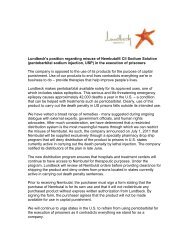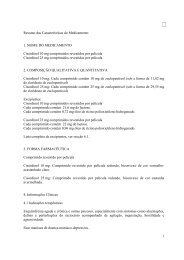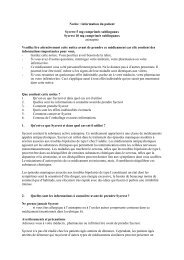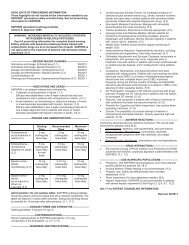Download - Lundbeck
Download - Lundbeck
Download - Lundbeck
- No tags were found...
You also want an ePaper? Increase the reach of your titles
YUMPU automatically turns print PDFs into web optimized ePapers that Google loves.
Depression is a common illness that affects many people throughoutthe world. About 10-15% of the population will suffer fromdepression during their lifetime, and it occurs more frequently inwomen and the elderly. A number of treatments are, however,available for depression, and it can be successfully treated in themajority of people.No doubt you are already familiar with at least some of thesymptoms of depression, and have experienced its debilitating effectson your life.This booklet contains information about the causes of depressionand its treatment, to help you and your family and friends to understandyour illness. By knowing more about the disorder you will beable to get maximum benefit from your treatment.1
Depression is an illness that can seriously impair all aspects of aperson’s life, including personal relationships, performance at workand enjoyment of leisure activities.One of the features of depression which can make it difficult todiagnose, is that no two people will have exactly the same symptomsassociated with the illness. A number of symptoms are, however,commonly seen:● irritability● feelings of guilt and/or helplessness● feelings of anxiety● inability to concentrate or make decisions● reduced appetite● loss of interest in personal appearance● loss of interest in favourite activities● difficulty in sleeping (either in falling asleep when first going tobed, or waking during the night and being unable to get back tosleep)● difficulty getting up in the morning● constant feelings of tiredness/lack of energy● changes in weight● physical symptoms, such as headache or backache.These symptoms will, typically, develop over a period of severalweeks or months, and several will be present at the same time.There are many myths and misconceptions about depression. Itis important to know that depression is not:● just feeling ‘a bit down’- depression has a profound effect on your everyday life
● a sign of weakness- depression is ultimately caused by an imbalance of specialchemical substances in the brain, called transmitters, thoughpersonality and life events resulting in stress may have contributedto the imbalance● a ‘punishment’ because you are a bad person- depression is an illness that can affect anyone● something to feel guilty about-remember, it is not your fault.Many people think that depression will go away if the suffererjust makes an effort to think positively or to go out and enjoy himor herself. Unfortunately, they do not understand that depressionis an illness that requires specific treatment, just as every other illnessdoes. This lack of understanding can itself make the depressed personfeel even more helpless and isolated. It also means that people withdepression are often reluctant to tell their friends and colleaguesabout their condition.Sometimes, people become depressed following a particularlystressful period in their lives, such as the death of a close relative orfriend, or after losing their job, and there is evidence that somepeople inherit an increased risk of becoming depressed.Fortunately, a number of effective medicines and psychologicalinterventions are available to treat depression, and the illness can besuccessfully treated in the majority of people. By visiting your doctorand having your depression diagnosed, you have already taken thefirst step on the road to recovery. Read on to see how you can getthe most from your treatment.3
Treating depressionEffective treatment of depression usually requires a combination ofmedication and counselling or psychotherapy.A large number of effective medicines are available for the treatmentof depression, but they can be subdivided into four main categories:● monoamine oxidase inhibitors (MAOIs)● tricyclic antidepressants (TCAs)● selective serotonin re-uptake inhibitors (SSRIs)● serotonin-norepinephrine re-uptake inhibitors (SNRIs).Your doctor will have given careful consideration to choosing theindividual medication that will be the most appropriate for yourtreatment.It is important to realise that antidepressants do not act immediately,in the way that, for example, antibiotics do. It may take about 4-6weeks of treatmentbefore you will notice asignificant improvement inyour symptoms. In addition,you will have to continuetaking your medicationfor 6-12 months or possiblylonger, to ensure yourrecovery is complete.4
Professional healthcare workers, including your general practitioner(GP), a counsellor or psychotherapist or a psychiatrist, will be involvedin/with your treatment but you are also an important member of yourcare team.The most important thing you can do is to remember to take yourmedication regularly, following the directions from your doctor.Antidepressants can, however, produce a range of side-effects, includingdry mouth, blurred vision and altered bowel function (diarrhoea orconstipation). If any of these are a particular problem, or if you thinkyou have developed any other symptoms as a result of your medication,do not stop taking your medicine, but tell you doctor as soon aspossible about your symptoms. He or she can then decide upon themost appropriate action to take (e.g. reducing thedosage, switching to a different product).Even if you are feeling much better, you shouldcontinue to take your medication and attend regularfollow-up consultations with your doctor. At these visitsyou can discuss the ways in which your symptoms havechanged and assess the effectiveness of your treatment.It is important that you discuss honestly all your feelings andconcerns with your doctor or counsellor. They will not be shocked ifyou tell them, for example, that you have had thoughts about suicide,as these are not unusual in people with depression. There are nophysical measurements, such as temperature or blood pressure, whichgive the doctor any clue about your symptoms of depression. Onlyyou know how you are feeling, and the doctor and counsellor needthis information to ensure that you receive the most effective treatment.5
Your GP will make the initial diagnosis of depression, and will starttreatment with one of the antidepressant drugs. The choice ofmedication will be influenced by the particular types of symptomsthat you have described, the side-effects of the different medicationavailable, and also your GP’s knowledge of other aspects of yourhealth (e.g. whether you are already taking medication for anothercondition).It is important that you take your medication regularly, and that youdiscuss any concerns about your illness or its treatment with your GP.6
It is only by knowing exactly what yourneeds and concerns are that your GP canensure that you will receive the mosteffective treatment.Your GP may provide you withcounselling or you may be referred to aspecialist counsellor. Your GP may alsorefer you to other healthcare professionals,such as a psychotherapist or a psychiatrist,depending upon your symptoms and yourresponse to treatment.Your doctor will want to see youregularly throughout your treatment.During these consultations you may:● discuss how you are feeling and whetheryour symptoms are improving● review any problems you may have asa result of side-effects of yourmedication● consider whether any changes in yourtreatment are needed● discuss any other concerns that youmay have about your illness or itstreatment, including aspects of yourlife that may be influencing yourresponse to treatment
What your counsellorcan doMany people with depression find that a course of counselling canhelp them to identify why they have become depressed. Counselling,used in addition to antidepressants, is an important part of thetreatment of depression. Counselling will help your recovery andreduce the chances of the illness coming back.Just as no two people have exactly the same symptoms of depression,their needs for counselling will also differ. Your counsellor will wantto build up a detailed picture of your life, including informationabout your employment and your family, as well as your symptomsof depression and how they started. This will help him or her todecide upon the most appropriate counselling approach for you.
Counselling may take many different forms. For example, someonewho has become depressed following the death of a loved one mayneed help to come to terms with their feelings of loss and grief, whilesomeone with feelings of anxiety may be taught relaxation techniques.Contrary to what many people believe, counselling is not alwaysa ‘soft option’. It can often be difficult to admit to some of thefeelings you may be experiencing, or to relieve a past trauma.However, many people find that they feel better once they havediscussed these things. It is important that you attend your counsellingsessions regularly so that you can work through such experiencestogether with your counsellor, helping you to recover as quickly aspossible from your illness.9
Depression can be a difficult illness for your family and friendsto understand. It is confusing and distressing for them to see someonethey love become withdrawn and irritable, and show no interest inactivities that he or she previously enjoyed. If they do not realisethat you are ill, they may feel hurt or rejected when you refuse theirinvitation to join in social activities.It is important for your family and friends to understand thatdepression is a serious illness, but that it can be treated successfully.They also need to be aware that it take some time for you to makea full recovery and that, contrary to popular belief, depression is notsomething that you can just ‘snap out of’.If you have difficulty talking about your illness to family andfriends, you may decide that you would like your doctor to explainyour condition and its treatment to them. Once they understandthe nature of your illness, your family and friends can help byreminding you to take your medication and encouraging you to goto your counselling sessions. As you begin to recover, you will wantto start building up your social activities again, but your friendsshould realise that you need to do things at your own speed, andshould not feel hurt if you turn down some of their invitations.They will understand this better if you talk to them openly aboutyour illness and the way you feel.
Depending upon the nature of your symptoms and their responseto treatment, your GP may decide to refer you to another healthcarespecialist, such as a psychotherapist or a psychiatrist.A psychotherapist will work with you to identify particular areasin your life that may have contributed to the development of yourdepression. He or she will then help you to address these problems,possibly by learning new patterns of behaviour, or by confrontingspecific fears or anxieties.You should not be alarmed if your are referred to a psychiatrist.Just as your GP would refer you to a cardiologist if you had heartdisease, he or she may decide that you would benefit from treatmentby someone who specialises in the care of people with mental illnesses.As a specialist, the psychiatrist will have access to a wider range oftreatment options than are available to your GP.
Some people find it helpful to talk to others with depression. It canbe reassuring to know that you are not the only person to experiencethe feelings of hopelessness that have troubled you recently. You canalso exchange ideas about techniques that can help you to feel betterabout yourself during your treatment.Your doctor or counsellor should be able to provide contactdetails for self-help groups in your area, if you are interested injoining such a group.If you have access to the Internet, you will find that there are anumber of sites devoted to depression. Many of these have beendeveloped by people with depression, and they may provide youwith useful information about your illness and helpful hints on howto manage it.For further information on depression visit:www.depnet.co.zawww.lundbeck.comwww.firstsupport.co.zaSADAGSouth African Depression and Anxiety Support Group:Tel: 0800 567 567www.sadag.orgAlzheimer’s/Dementia Support Services:Alzheimer’s SA:Help Line 0860 102 681National office 011 478 2234www.alzheimers.org.zaDementia SA:021 421 0077/8021 418 5888E-mail: info@dementiasa.orgwww.dementiasa.orgParkinson’s Disease:Parkinson Association011 787 8792www.parkinsons.co.za
Use this page to fill in useful addresses and telephone numbers. Forexample, you may like to include your doctor, counsellor and supportgroup. You could also include appropriate Internet addresses.Name _______________________________________________Contact details________________________________________________________________________________________________________________________________________________Name _______________________________________________Contact details________________________________________________________________________________________________________________________________________________Name _______________________________________________Contact details________________________________________________________________________________________________________________________________________________
Conversion of Raw Scores to SDS Index(Index = Raw Score Total x 100)Maximum Score of 80RawScoreSDSIndexRAWScoreSDSIndexRawScoreSDSIndex20 25 40 50 60 7521 26 41 51 61 7622 28 42 53 62 7823 29 43 54 63 7924 30 44 55 64 8025 31 45 56 65 8126 33 46 58 66 8327 34 47 59 67 8428 35 48 60 68 8529 36 49 61 69 8630 38 50 63 70 8831 39 51 64 71 8932 40 52 65 72 9033 41 53 66 73 9134 43 54 68 74 9235 44 55 69 75 9436 45 56 70 76 9537 46 57 71 77 9638 48 58 73 78 9839 49 59 74 79 9980 100The SDS Index can be interpreted as follows:SDS IndexEquivalent Clinical Global ImpressionsBelow 50 Within normal range, no psychopathology50-59 Presence of minimal to mild depression60-69 Presence of moderate to marked depression70 and over Presence of severe to extreme depression© W.W.W. Zung, 1974, 1989
Everybody needs supportduring difficult timesThe mySupport Programme:There for you during yourrecovery from anxietyand depression
The mySupport programme is an online, confidential, secure, anxiety anddepression support programme with the following benefits:Information :Health library on depression and anxietyPodcasts eg: what to expect from antidepressantsAsk the expert – disease related questionsMonthly professionally qualified guest speakers on various topicsVideos on different psychiatric disordersSelf rating scales to monitor your progressSupport :Forum to share thoughtsCoping tips e.g.: diet, exerciseAppointment remindersGo to www.firstsupport.co.za to see all thebenefits of the mySupport programmeAsk your doctor about the mySupport programmeand get connectedMajor sponsor of the SA Depression and Anxiety Support Group (SADAG) Tel: 0800 567 567. www.sadag.orgBrought to you by <strong>Lundbeck</strong> in the interest ofpatient well-beingMO/09/11
<strong>Lundbeck</strong> South Africa (Pty) Ltd.Montroselaan 252, North Riding 2194Posbus 2171, North Riding 2162Telefoon +27 11 699 1600Faks +27 11 795 2252



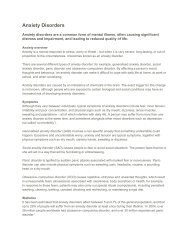


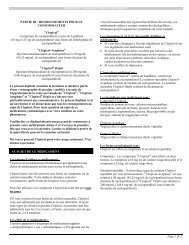
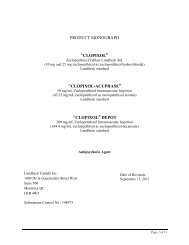
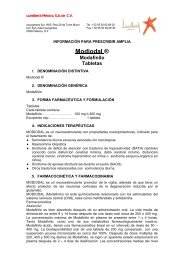
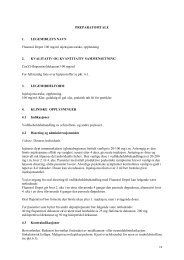
![[Product Monograph Template - Standard] - Lundbeck](https://img.yumpu.com/49015733/1/190x245/product-monograph-template-standard-lundbeck.jpg?quality=85)


